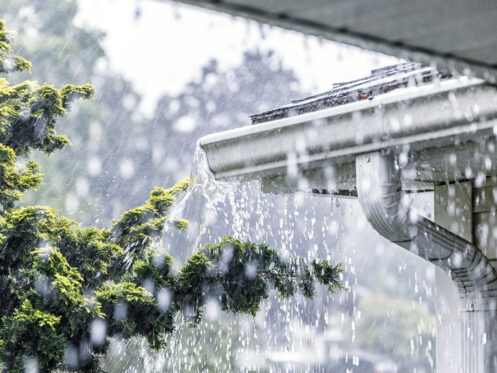Air conditioners are extremely robust and designed in a way that they can easily withstand rain, snow, and the elements without much of an issue. Nonetheless, there are still times when a major storm, such as a hurricane, can potentially impact your AC unit and lead to issues with corrosion or electrical problems. While hurricanes are not typically something you need to worry about in the Garland, TX area, flash floods caused by heavy rains do occur and can have the potential to harm your AC unit. We will look at the ways that heavy rain and other types of weather can impact your air conditioner and how to know if your unit has a problem.
How Rain and Flooding Can Impact Your AC Unit
Heavy rainfall normally is not an issue for air conditioners, as the units are designed so that all of the most sensitive components are protected. In fact, you could leave your air conditioning system running during a torrential downpour without it experiencing any problems. The only time that issues arise is if it rains so much that there is lots of standing water that starts to flood the unit. Rainfall alone is not enough to damage any of the electrical components, but being subjected to lots of standing water for any period of time definitely can.
A few inches of standing water is not a problem, as the water will not reach any of the more sensitive parts of the unit. However, you should always have your AC unit inspected before using it again if there is ever more than 15 inches of standing water. If the water does rise above 15 inches, it can come into contact with and potentially damage the unit’s wiring and electrical connections. This can then create major electrical problems that could ruin the unit if you were to try to run it before having the unit inspected.
If your AC unit does ever get flooded with a large volume of water, you may still be able to have the equipment repaired depending on the extent of the damage and how long the water sat inside the unit. However, there are times when the damage may be severe enough that the much better option will be to replace the entire unit instead. This is especially the case if the system is flooded for more than a few hours. It is also important to consider the age of your equipment. It does not make sense to repair a unit that is more than 10 years old since it likely only has a few years of life left anyway.
Wind and Debris
The bigger issue with major storms is that they can blow sticks, leaves, and other debris inside the unit. Sticks and even small twigs can sometimes get stuck in the fan grille on the top of the unit and interfere with the fan blades or prevent the fan from spinning altogether. This can be a serious problem, as it could lead to the fan motor overheating and burning out if the unit were to continue to run.
A fan that does not spin or cannot move air properly can also create other issues. It will make it much more difficult for the unit to disperse all the heat that it removed from inside the home. This can limit how well the AC system cools since it can cause the refrigerant to be at a higher temperature when it flows into the house. As a result, it will not be able to absorb as much heat from the air inside the house. If the fan isn’t working properly, it can also cause the unit’s compressor motor to start overheating or potentially burn out.
Having lots of leaves and other organic matter inside the AC unit can also lead to issues with rust and corrosion. The fact that the sides of an AC unit are mostly open allows plenty of air to flow through the unit even when it is not running. This helps to ensure everything quickly dries out after a major rain. The issue here is that leaves and debris will hold onto lots of moisture and prevent things from drying out fully. As a result, all of that moisture can cause various components to begin rusting and experiencing a variety of issues caused by corrosion. Moisture can also cause the insulation around all of the unit’s wiring to rot and possibly lead to short-circuiting and other electrical problems.
Rust and corrosion are also why most experts recommend never covering your AC unit when you are not using it. If you were to cover the unit with plastic or a tarp, moisture would quickly build up and lead to corrosion. If you do want to cover your AC unit during the winter when it is not in use, the best way is to use a breathable cover specifically designed for an air conditioner. The other option is to use a tarp, but only let it hang no more than 8 to 10 inches over the side of the unit. This will prevent debris from getting inside while also ensuring there is adequate airflow to prevent moisture from building up inside the equipment.
All of these potential issues are why it is always a good idea to give your AC unit a quick inspection after any major storm and before you turn it back on. Sticks and debris stuck in the fan grille can easily be removed by hand when the unit is shut off. If you notice lots of leaves and other debris inside the unit, you will usually need to have an AC technician clean the equipment for you. The reason is that the only way to access the inside of the unit is to remove the fan assembly and fan motor, and this definitely is not something you want to try to do on your own.
Lightning
The other detail you sometimes need to worry about during a major storm is lightning. It is highly unlikely that lightning would ever directly strike your air conditioner itself. Still, if lightning were to strike your home or even a power pole or transformer in your neighborhood, it could produce a power surge and cause major damage to your electrical system. This could potentially ruin your AC unit and other electronics and appliances. The only way to prevent this problem is to install a whole-home surge protector, which will work to instantly shut off your electrical system and channel all of the current out through the grounding rod instead of surging through your electrical system.
Our Services
If your AC unit was flooded or damaged in a storm and you need to have it inspected, you can trust the experts at On Time Experts. We offer our AC repair services for all brands, models, and types of air conditioners as well as heat pumps, mini-split systems, and furnaces. We also specialize in heating and cooling installation and indoor air quality. Plus, we offer a full range of residential plumbing services. To schedule an AC inspection or any other cooling, heating, or plumbing service in Garland or the Dallas area, contact us today.

